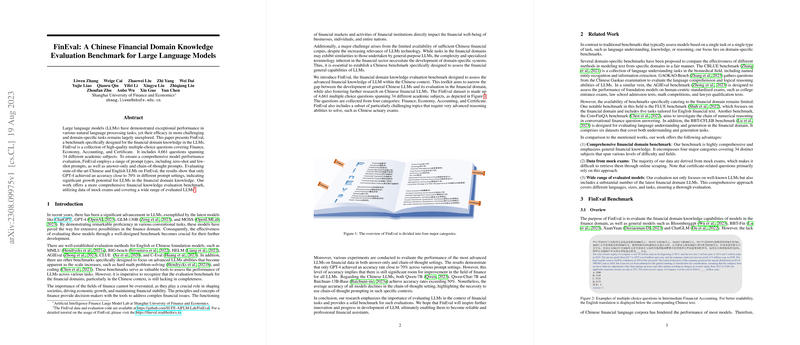Overview of "FinEval: A Chinese Financial Domain Knowledge Evaluation Benchmark for LLMs"
The paper "FinEval: A Chinese Financial Domain Knowledge Evaluation Benchmark for LLMs" introduces FinEval, a significant development in the domain of specialized benchmarks for evaluating LLMs within financial contexts. The necessity of such a benchmark arises from the critical role that finance plays in shaping societal structures and economic growth, coupled with the increasing application of LLMs across diverse domains.
Key Contributions
1. Benchmark Design and Scope:
FinEval is specifically crafted to assess the proficiency of LLMs in Chinese financial knowledge. The benchmark is comprised of 4,661 multiple-choice questions spread across four major categories: Finance, Economy, Accounting, and Certificate. These categories encompass 34 distinct subjects pertinent to the financial sector. This breadth ensures a comprehensive evaluation across various facets of financial knowledge, distinguishing FinEval from other existing benchmarks.
2. Evaluation Methodology:
The benchmark employs a range of prompts, including zero-shot, few-shot, answer-only (AO), and chain-of-thought (CoT), to provide a nuanced assessment of LLM performance. This varied approach helps capture the models' capabilities in both straightforward question-answering tasks and more complex reasoning tasks.
3. Model Performance and Insights:
Through extensive evaluation of state-of-the-art Chinese and English LLMs on FinEval, the paper provides critical insights into their performance and areas for improvement. Notably, GPT-4 demonstrates the highest accuracy, achieving close to 70% in different settings, which underscores the potential of advanced LLMs in the financial domain.
Contributions to the Field
The implications of FinEval are both practical and theoretical. On a practical level, FinEval provides a detailed benchmarking tool that can guide the tuning and improvement of LLMs for better performance in financial applications. The availability of specific data sets and evaluation criteria enables an objective comparison of different LLMs, fostering competition and innovation in model development.
Theoretically, the paper highlights the challenges associated with processing financial data, particularly in the nuanced Chinese context. The empirical results emphasize the complexity of financial problems and the necessity of domain-specific training to achieve meaningful performance improvements. Furthermore, the decrease in model accuracy in CoT settings across many subjects suggests opportunities for further exploration and enhancement in reasoning capabilities.
Future Directions
The paper concludes with aspirations to extend FinEval to cover more specialized financial scenarios such as virtual assistants and fraud detection. This vision underscores an ongoing commitment to refining and expanding the evaluation of LLMs within highly specialized domains. Additionally, the paper suggests a critical area of future research in enhancing foundation models through tailored instruction tuning, particularly by leveraging few-shot learning for further adaptation to domain-specific tasks.
In summary, FinEval is poised to be a pivotal resource in evaluating and advancing LLM capabilities in the financial domain. Its comprehensive design and insightful results set a new standard in domain-specific model assessment, paving the way for future breakthroughs and innovations in artificial intelligence.
